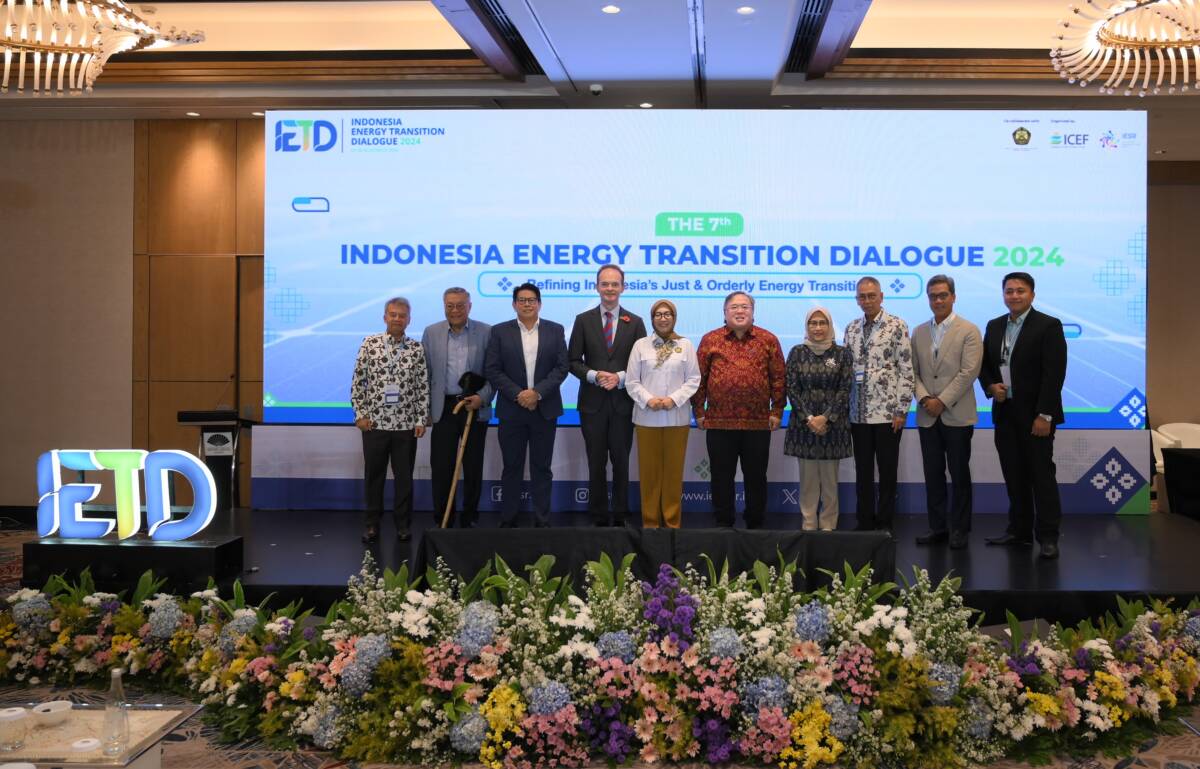Jakarta, November 4, 2024 – Ensuring a just energy transition is essential for achieving the net zero emissions (NZE) target by 2060 or sooner, while also advancing the Golden Indonesia 2045 vision. Moreover, accelerating a just energy transition will support Indonesia’s commitment made at the Conference of Parties (COP-28) to triple renewable energy capacity and double energy efficiency efforts by 2030, aiming to limit global temperature rise to 1.5 degrees Celsius.
Prof. Bambang Brodjonegoro, Chairman of the Indonesia Clean Energy Forum (ICEF), stated that achieving these targets requires a fair, orderly, and inclusive approach. He emphasized that for Indonesia, increasing renewable energy capacity and improving energy efficiency will demand concrete actions that prioritize social and economic equity.
“Our approach for a just and orderly energy transition must be collaborative, encompassing policy adjustments, infrastructure investments, and human resource development. This means aligning energy and economic policies to support job creation, economic resilience, and sustainable growth, ensuring no one is left behind in the transition process,” said Bambang at the opening of Indonesia Energy Transition Dialogue (IETD) 2024, organized by the Institute for Essential Services Reform (IESR), the Indonesia Clean Energy Forum (ICEF), and the Ministry of Energy and Mineral Resources (MEMR) in Jakarta today (4/11/2024).
Bambang also emphasized the need for policymakers and stakeholders to shift their perspective, viewing the energy transition as an economic opportunity rather than a burden. This approach can attract greater investment and help build a sustainable business ecosystem. Additionally, integrating sustainable practices into the Indonesian economy will support the Asta Cita agenda of the Prabowo-Gibran administration in achieving eight percent economic growth.
Dominic Jermey CVO, OBE, the British Ambassador to Indonesia and Timor Leste, stated that as part of climate mitigation efforts, the UK ended the operation of its last coal-fired power plant last month, making its electricity supply entirely coal-free.
“The UK is committed to deliver climate ambition, not only at home, but also with partners like Indonesia, and collaborating together because these are global challenges that require global action. In Indonesia, more than USD 800 million of investment have been approved so far through the Just Energy Transition Partnership (JETP). Another USD 5-6 billion in international JETP finance is under negotiation and ready to flow, ready to support that transition to renewable energy. Indonesia is not alone in your energy transition journey. As your global partners, the UK, the International Partners Group of the Just Energy Transition Partnership, we the global community are there to support you, to decarbonize your energy sector,” explained Dominic.
Fabby Tumiwa, Executive Director of IESR, stated that achieving a just and orderly energy transition requires a strong commitment and leadership capable of motivating stakeholders to take concrete steps in increasing the renewable energy mix, implementing energy efficiency measures, fostering cross-sector collaboration, and overcoming investment barriers to meet national targets.
“Increasing the renewable energy mix calls for greater investment, which will contribute to the high economic growth target of eight percent set by the Prabowo leadership. Moreover, clear targets and rising domestic demand for clean energy technology can drive investment interest in clean energy technology manufacturing, provided there is adequate policy and regulatory support. Growth in this domestic manufacturing industry will contribute to economic expansion. Additionally, the availability of clean energy can attract downstream investments and support other manufacturing industries. Therefore, the government must harmonize development planning, align energy transition policies with industrial policies, and improve the quality of human resources,” Fabby explained.
Meanwhile, Prof. Eniya Listiani Dewi, Director General of New Renewable Energy and Energy Conservation (EBTKE), stated that renewable energy investment in Indonesia still requires substantial growth. Based on the renewable energy projects outlined in the 2021-2030 Electricity Supply Business Plan (RUPTL), there exists an investment opportunity of USD 15.9 billion. Eniya added that the government is working to attract this investment by issuing Minister of Energy and Mineral Resources Regulation No. 11/2024 on the Use of Domestic Products for Electricity Infrastructure Development, along with Minister of Industry Regulation No. 33/2024 on Guidelines for the Use of Domestic Products for Electricity Infrastructure Development. These efforts aim to accelerate renewable energy infrastructure development while fostering a domestic renewable energy industry.
The Indonesia Energy Transition Dialogue (IETD) 2024 marks the seventh IETD since its inception in 2018. Held from November 4-6, 2024, IETD 2024 carried the theme “Delivering a Just and Orderly Energy Transition.” It included 11 sessions covering a wide range of topics and formats, featuring 50 national and international speakers, panelists, and moderators.
The outcomes of IETD 2024 will be summarized and provided as input to the Prabowo-Gibran administration to support the design of an equitable energy transition program, contributing to the goal of energy independence over the next five years.

